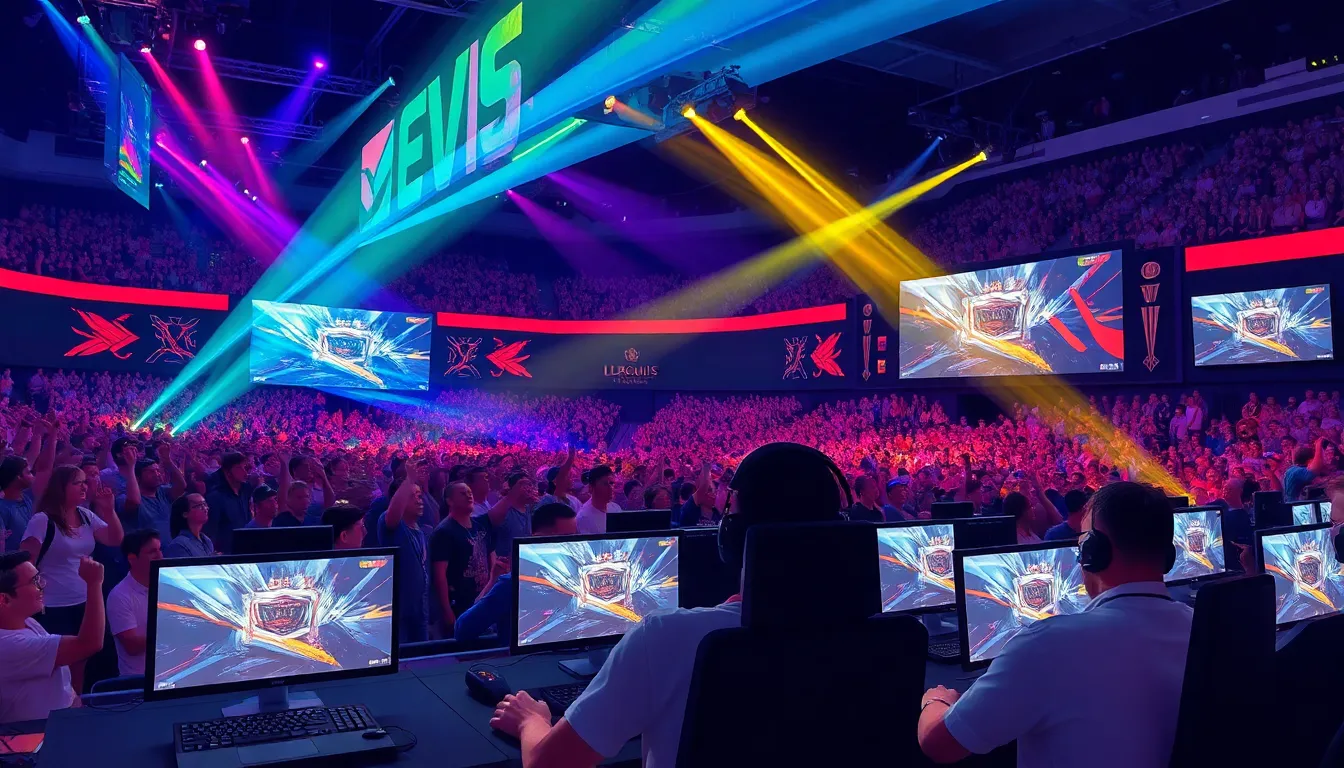Table of Contents
ToggleEsports has taken the world by storm, turning casual gamers into global superstars faster than you can say “game over.” But as the debate heats up, one question looms larger than a final boss: should esports be considered a sport? On one hand, you’ve got the adrenaline-pumping competition and the skill that’d make even the most seasoned athletes sweat. On the other, there’s the undeniable fact that most players are more likely to be found in a gaming chair than a gym.
The Definition of Sports
Sports encompass competitive activities that involve physical exertion, skill, and often teamwork. The ongoing debate about whether esports fits this classification hinges on the specific characteristics of traditional sports and the emergence of new sport forms.
Characteristics of Traditional Sports
Traditional sports include several key traits. They require physical skill, such as strength, endurance, and coordination. Most involve a set of rules or regulations that govern gameplay. Players engage in organized competition, either individually or as teams. The objective usually revolves around scoring points or completing the game more successfully than opponents. Examples include soccer, basketball, and tennis. Competitive spirit and the pursuit of excellence often define these activities.
Emergence of New Sports Forms
New sport forms have gained prominence recently. Esports exemplifies this evolution, highlighting the blend of competition and entertainment through video gaming. Increasingly, these games demand strategic thinking, quick reflexes, and teamwork. They attract millions of viewers, similar to traditional sports events. Other examples include drone racing and parkour. Such activities reflect changing societal interests and technological advancements.
The Rise of Esports

Esports has experienced significant growth, drawing millions of fans and players worldwide. The competitive landscape of esports continues to evolve, creating new opportunities and communities.
Popularity and Growth
During the past decade, esports surged with an annual growth rate exceeding 15%. Gamers and fans alike contribute to a global audience surpassing 500 million individuals. Streaming platforms and social media play integral roles in promoting esports content, engaging viewers in real-time gaming experiences. Popular titles such as League of Legends and Dota 2 dominate the scene, attracting millions of participants and spectators. Gamers often seek competition and camaraderie, finding community among fellow enthusiasts. Investments in esports teams and tournaments signify the movement’s increasing legitimacy, leading to enhanced sponsorship opportunities and commercial partnerships.
Major Esports Events
Major esports events capture international attention and showcase top-tier talent. Events like The International and the League of Legends World Championship draw huge crowds, with prize pools reaching over $30 million. Fans eagerly attend live tournaments, creating electric atmospheres comparable to traditional sporting events. Additionally, major sponsors align with these competitions, further solidifying their significance in the global sports landscape. Organizations consistently host championships throughout the year, providing regular engagement for viewers and players. Accessibility through online streaming allows audiences to experience thrilling matches from anywhere in the world. These large-scale showcases elevate esports to mainstream recognition, solidifying its status as a legitimate form of competition.
Arguments in Favor of Esports as a Sport
Esports demonstrates characteristics aligning it with traditional sports. The skill and strategy involved in competitive gaming elevate its status significantly.
Skill and Strategy
High-level esports requires substantial skill, comparable to athletic disciplines. Players develop quick reflexes, precise hand-eye coordination, and advanced problem-solving abilities. Game titles like StarCraft II and Overwatch demand strategic planning, ensuring victory through meticulous tactics. Mastery of game mechanics often stems from extensive practice, similar to athletes training for physical sports. Competitive gamers analyze opponents’ behaviors, making real-time decisions that affect the outcome of matches. Rigorous mental focus parallels that found in traditional sports, showcasing that esports isn’t simply about gaming. Engaging with critics, those advocating for esports emphasize the depth of strategic elements governed by rules, further reinforcing it as a legitimate sporting endeavor.
Competitive Nature and Tournaments
Esports thrives on its highly competitive nature, mirroring the intensity of traditional sports. Major tournaments such as the League of Legends World Championship draw millions of viewers and feature immense prize pools exceeding $30 million. Teams in these tournaments often engage in intense preparation, including daily practices, just like professional athletes. The organization of these events includes brackets, rounds, and championships, creating a structured competitive atmosphere. Fans follow their favorite teams almost religiously, akin to how they would support a football or basketball team. The atmosphere of major esports events captures the excitement found in stadiums, solidifying its position within the global sports community.
Arguments Against Esports as a Sport
Esports face significant opposition regarding their classification as a sport. Critics often emphasize the lack of physical activity associated with gaming.
Physical Activity Debate
Physical exertion serves as a cornerstone for traditional sports. In contrast, many esports involve minimal physical movement. Players typically sit for hours, focusing on strategy and coordination rather than engaging in physical training. While esports demand mental acuity, skeptics argue competition without substantial physical activity doesn’t fit traditional definitions of sport. The absence of running, jumping, or similar physical actions leads some to question their validity as sports. Critics assert that without these elements, esports fail to meet the standards established by established athletic activities.
Perception and Stigma
Societal perceptions heavily influence the ongoing debate around esports. Many view gaming as a leisurely activity rather than a competitive sport. Stigma occasionally stems from misconceptions about gamers’ lifestyles, portraying them as sedentary participants. This image often conflicts with the rigorous training and teamwork found in esports. Gamers invest countless hours honing their skills, yet prevailing stereotypes can undermine recognition as athletes. Acceptance within the broader sports community remains challenged due to these entrenched perceptions. Skeptics continue to express doubts about the legitimacy of esports in comparison to traditional sports.
The Middle Ground: Recognizing Esports
Esports occupies a unique position in the sports debate. Competitive gaming attracts millions, creating an atmosphere reminiscent of traditional sports events.
Blurring the Lines Between Sports and Gaming
Esports combines skill and teamwork, similar to traditional sports. Titles like League of Legends and Dota 2 showcase strategic gameplay, drawing parallels to chess in terms of mental rigor. Competitive tournaments often feature extensive planning by teams, underscoring the dedication involved. Players exhibit rapid reflexes and precision, which aligns with the physical demands seen in athletics. As these similarities emerge, societal perceptions begin to shift, recognizing the structured environment of esports. Engaging audiences through live streaming further solidifies this connection to traditional sports.
The Future of Esports in the Sports Industry
Esports continues to expand, with participation and viewership increasing significantly. The annual growth rate of over 15% highlights its potential impact on the sports landscape. Traditional sports leagues, like the NBA, are embracing esports, opening avenues for collaboration. Sponsorship deals and mainstream media coverage bridge the gap between these two worlds. Esports events boast audience numbers rivaling major sporting events, signaling growing acceptance. As technology advances, the integration of esports into the sports industry seems inevitable. This evolution could redefine how competition is viewed in the years to come.
The debate over whether esports should be classified as a sport continues to evolve. With its rapid growth and the increasing legitimacy it garners, esports stands at a unique intersection of competition and entertainment. The skill and strategy required in high-level gaming parallel those found in traditional sports, challenging preconceived notions about what defines athleticism.
As society’s perceptions shift and acceptance grows, esports is likely to carve out a permanent place in the sports landscape. The collaboration between traditional sports leagues and esports further solidifies its status, paving the way for a future where competitive gaming is recognized alongside conventional athletic endeavors. Embracing this change could lead to a broader understanding of sports in the modern age.




